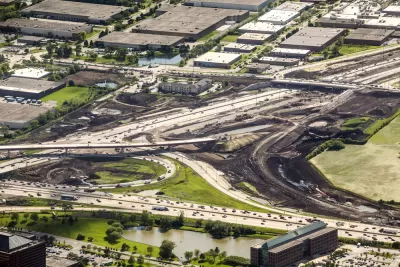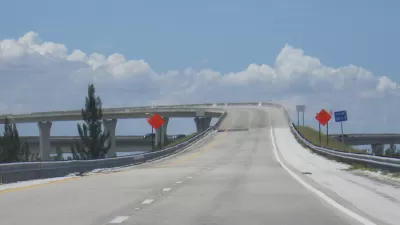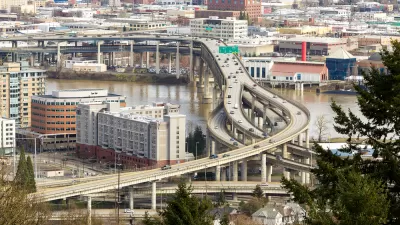U.S. PIRG has released the latest edition of the Highway Boondoggles report, the sixth edition of the report published since 2014.

The reasons for transportation planners and engineers to heed the warnings of the Highway Boondoggles 6 report, published this week by U.S. PIRG are legion. Here's how the website that shares the new report states the crises facing car-centric transportation in the United States:
America’s aging roads and bridges are in increasingly dire need of repair. Tens of thousands of people die on the roads each year and more are sickened or die from air pollution caused by vehicles. Tens of millions of Americans lack access to quality public transit or safe places to walk or bike, leaving them fully dependent on cars or – for those who cannot afford a car or are physically unable to drive – entirely shut off from critical services and opportunities.
Add that toxic mess to the economic crisis created by the coronavirus pandemic, and "Now is no time to fritter away scarce public resources on wasteful boondoggle projects."
Planetizen has noticed a spate of recent news about state and regional authorities gearing up to expand and extend highways—in defiance of these various warnings. (Click through to see the rest of the thread on the source Tweet.)
Calling attention to the recent spate of news regarding massive highway widening projects around the United States.
— James Brasuell (@CasualBrasuell) November 11, 2020
Highway Boondoggles 6 focuses on seven new projects, singling out Florida's Multi-use Corridors of Regional Economic Significance (M-Cores) program as the most potentially destructive. "This $10 billion, 330-mile, multi-highway construction project, would strain the state’s already overstretched budget in addition to impacting some of Florida’s last remaining undeveloped lands, threatening the endangered Florida panther with extinction," according to the U.S. PIRG statement. "Despite cutting $1 billion from the budget in response to the COVID-19 pandemic, the state’s 2020-21 budget, approved by Gov. Ron DeSantis, still includes $90 million for M-CORES."
Matt Casale, director of U.S. PIRG Environment Campaigns Director, says a shift in transportation spending could be a key tool in a post-pandemic economic recovery. "If we’re smarter about how we spend our transportation dollars and focus instead on building a 21st-century transportation system, America can build a better world coming out of the COVID-19 pandemic, one with less pollution, less gridlock and more public and active transit," said Caale in an emailed statement.
Now that the Highway Boondoggles report has built up a little bit of an archive, it's also possible to evaluate the outcomes of the 60 projects profiled in previous editions of the report. An interactive map offers insight into these projects on the U.S. PIRG website. A few of the 60 projects have been canceled, but most are under construction or under study and review).
Highway Boondoggles 6 also includes an evaluation of one such project: the I-94 expansion project in Milwaukee.
"This project serves as a reminder that wasteful highway construction projects can still be revived by incoming state legislators even after scheduled work and funding approval have been rescinded," according to the U.S. PIRG. "The project’s resurrection and over $1 billion price tag also comes amid budget shortfalls related to the COVID-19 pandemic: Wisconsin has suffered steep decreases in revenue and in July, Gov. Evers ordered state agencies to cut their budgets by $250 million."
The latest news shared by Planetizen on the Interstate 94 plans was written by a coalition of environmentalists in Wisconsin who describe the project as a "fiasco" and call on Wisconsin Governor Tony Evers to pull the plug.
FULL STORY: Highway Boondoggles 6

Maui's Vacation Rental Debate Turns Ugly
Verbal attacks, misinformation campaigns and fistfights plague a high-stakes debate to convert thousands of vacation rentals into long-term housing.

Planetizen Federal Action Tracker
A weekly monitor of how Trump’s orders and actions are impacting planners and planning in America.

San Francisco Suspends Traffic Calming Amidst Record Deaths
Citing “a challenging fiscal landscape,” the city will cease the program on the heels of 42 traffic deaths, including 24 pedestrians.

Defunct Pittsburgh Power Plant to Become Residential Tower
A decommissioned steam heat plant will be redeveloped into almost 100 affordable housing units.

Trump Prompts Restructuring of Transportation Research Board in “Unprecedented Overreach”
The TRB has eliminated more than half of its committees including those focused on climate, equity, and cities.

Amtrak Rolls Out New Orleans to Alabama “Mardi Gras” Train
The new service will operate morning and evening departures between Mobile and New Orleans.
Urban Design for Planners 1: Software Tools
This six-course series explores essential urban design concepts using open source software and equips planners with the tools they need to participate fully in the urban design process.
Planning for Universal Design
Learn the tools for implementing Universal Design in planning regulations.
Heyer Gruel & Associates PA
JM Goldson LLC
Custer County Colorado
City of Camden Redevelopment Agency
City of Astoria
Transportation Research & Education Center (TREC) at Portland State University
Jefferson Parish Government
Camden Redevelopment Agency
City of Claremont





























